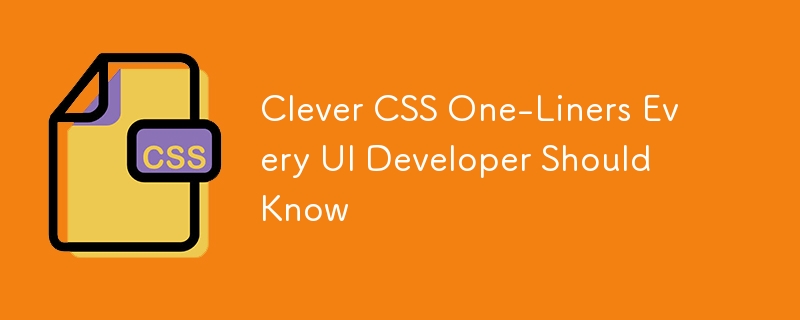每个 UI 开发人员都应该知道的聪明的 CSS 行话
- PHPz原创
- 2024-08-23 14:30:32473浏览

简介:简洁 CSS 的力量
作为一名 UI 开发人员,您总是在寻找简化代码并创建更高效、更引人注目的设计的方法。 CSS(层叠样式表)是您的武器库中的基本工具,掌握它可以显着提高您的生产力和工作质量。在这篇博文中,我们将探索 15 个独特的 CSS 行话,它们可以彻底改变您设计网页的方法。
这些紧凑的 CSS 技巧不仅可以节省时间,而且还展示了 CSS 的多功能性和强大功能。无论您是经验丰富的专业人士还是刚刚开始 UI 开发之旅,这些俏皮话都将为您的技能组合增值,并帮助您用更少的代码创建更精美、响应更快的设计。
让我们深入研究这些 CSS gem,看看它们如何改变您的开发过程!
1. 完美的居中技术
网页设计中最常见的挑战之一是将元素水平和垂直居中。这是一个 CSS 单行代码,可以轻松实现这一目标:
.center {
display: grid; place-items: center;
}
这个简单而强大的 CSS 技巧使用 CSS 网格将任何子元素置于其父容器中。 display: grid 属性创建一个网格容器,而 place-items: center 将网格项(在本例中为子元素)水平和垂直对齐在中心。
此方法适用于容器内的单个元素和多个元素。这是一个多功能的解决方案,可以让您免于为不同场景编写复杂的居中代码。
2. 响应式文本大小调整变得简单
创建响应式排版可能是一项挑战,但是这个 CSS 一行代码使它变得轻而易举:
body {
font-size: calc(1rem + 0.5vw);
}
calc() 函数的巧妙使用将基本字体大小 (1rem) 与视口宽度相关的值 (0.5vw) 结合起来。随着视口宽度的变化,字体大小也会相应调整,确保您的文本在不同的屏幕尺寸上仍然可读。
这种方法的优点在于它的简单性和灵活性。您可以通过修改计算中的值轻松调整基础大小和变化率。
3. 自定义滚动条样式
自定义滚动条可以为您的网站设计添加独特的风格。这是一个单行代码,允许您在基于 webkit 的浏览器中设置滚动条的样式:
::-webkit-scrollbar { width: 10px; background: #f1f1f1; border-radius: 10px; }
这个 CSS 技巧针对 webkit 浏览器(如 Chrome 和 Safari)中的滚动条伪元素。您可以调整宽度、背景颜色和边框半径以符合您的设计偏好。虽然这不适用于所有浏览器,但对于支持它的浏览器来说这是一个很好的增强。
4. 创建截断文本效果
处理动态内容时,经常需要截断超过一定长度的文本。这个 CSS 单行代码为溢出的文本创建了省略号效果:
.truncate {
white-space: nowrap; overflow: hidden; text-overflow: ellipsis;
}
这种属性组合确保文本保持在单行上(white-space: nowrap),隐藏任何溢出(overflow: hide),并在截断文本的末尾添加省略号(...)(文本溢出:省略号)。
5.整个页面平滑滚动
实现平滑滚动可以极大地增强网站的用户体验。这是一个简单的 CSS 单行代码,可实现整个页面的平滑滚动:
html {
scroll-behavior: smooth;
}
此属性可确保当用户单击页面中的锚链接时,浏览器平滑滚动到目标部分,而不是突然跳转。这是一个小小的改变,可以显着提高您网站的感知质量。
6. 创建响应式正方形
创建保持纵横比的完美方形元素可能很棘手,尤其是在响应式布局中。这是一个巧妙的 CSS 技巧来实现这一点:
.square {
width: 50%; aspect-ratio: 1;
}
纵横比属性确保元素的高度始终与其宽度相匹配,从而创建一个完美的正方形。您可以根据需要调整宽度百分比,并且元素将在不同的屏幕尺寸上保持其正方形形状。
7. 自定义文本选择样式
自定义所选文本的外观可以为您的网站添加独特的风格。这是一个 CSS 语句来实现这一点:
::selection { background: #ffb7b7; color: #000000; }
这个 CSS 技巧允许您更改网站上所选文本的背景颜色和文本颜色。您可以调整颜色以匹配您网站的配色方案,从而创建有凝聚力的品牌体验。
8. 轻松切换深色模式
为您的网站实施深色模式可以改善用户体验,尤其是对于夜间浏览的用户。这是一个简单的基于 CSS 变量的方法:
body {
--text-color: #333; --bg-color: #fff;
}
@media (prefers-color-scheme: dark) {
body { --text-color: #fff; --bg-color: #333; }
}
This CSS trick uses CSS variables to define colors and a media query to detect the user's color scheme preference. You can then use these variables throughout your CSS to easily switch between light and dark modes.
9. Creating a Frosted Glass Effect
The frosted glass effect, also known as glassmorphism, has become increasingly popular in UI design. Here's a CSS one-liner to create this effect:
.frosted-glass {
backdrop-filter: blur(10px); background-color: rgba(255, 255, 255, 0.5);
}
This combination of backdrop-filter and a semi-transparent background color creates a beautiful frosted glass effect. You can adjust the blur amount and background opacity to achieve the desired look.
10. Perfectly Rounded Corners
Creating perfectly rounded corners for elements of varying sizes can be challenging. Here's a CSS trick that ensures your elements always have perfectly round corners:
.round {
border-radius: 9999px;
}
By setting an extremely large value for border-radius, you ensure that the corners are always as round as possible, regardless of the element's size. This is particularly useful for buttons, badges, or any element where you want consistently round corners.
11. Easy CSS Grid Layout
Creating complex layouts with CSS Grid doesn't have to be complicated. Here's a one-liner that sets up a responsive grid:
.grid {
display: grid; grid-template-columns: repeat(auto-fit, minmax(200px, 1fr));
}
This CSS trick creates a grid where columns automatically adjust to fit the available space. The minmax() function ensures that columns are at least 200px wide but can grow to fill available space. This creates a responsive layout with minimal code.
12. Fluid Typography
Creating typography that scales smoothly across different screen sizes can be achieved with this CSS one-liner:
h1 {
font-size: clamp(2rem, 5vw, 5rem);
}
The clamp() function allows you to set a minimum size (2rem), a preferred size (5vw), and a maximum size (5rem) for your text. This ensures that your typography remains readable and visually appealing across all device sizes.
13. Creating a Triangle with CSS
Sometimes you need to create simple shapes like triangles for UI elements. Here's a CSS one-liner to create a triangle:
.triangle {
width: 0; height: 0; border-left: 50px solid transparent; border-right: 50px solid transparent; border-bottom: 100px solid #333;
}
This CSS trick uses border properties to create a triangle shape. By adjusting the border widths and colors, you can create triangles pointing in different directions.
14. Full-Bleed Layout
Creating a full-bleed layout, where some elements extend to the edges of the viewport while the main content remains centered, can be achieved with this CSS:
.full-bleed {
width: 100vw; margin-left: calc(50% - 50vw);
}
This CSS trick calculates the negative margin needed to extend an element to the full width of the viewport, regardless of the parent container's width. It's particularly useful for creating immersive background sections or full-width images within a constrained layout.
15. Animated Gradient Background
Adding a subtle animated gradient background can bring life to your design. Here's a CSS one-liner to create this effect:
.animated-gradient {
background: linear-gradient(270deg, #ff7e5f, #feb47b); background-size: 400% 400%; animation: gradient 15s ease infinite;
}
@keyframes gradient { 0% {background-position: 0% 50%} 50% {background-position: 100% 50%} 100% {background-position: 0% 50%} }
This CSS trick creates a gradient background that smoothly animates between colors. You can adjust the colors, animation duration, and easing function to suit your design needs.
Conclusion: Elevating Your CSS Game
These 15 CSS one-liners demonstrate the power and flexibility of CSS in creating efficient, responsive, and visually appealing designs. By incorporating these tricks into your workflow, you can:
- Streamline your code, making it more maintainable and easier to read.
- Solve common design challenges with elegant, concise solutions.
- Enhance the user experience with smooth animations and responsive layouts.
- Create more polished and professional-looking interfaces with minimal effort.
Remember, the key to mastering CSS is not just knowing these tricks, but understanding how and when to apply them. As you incorporate these techniques into your projects, you'll develop a deeper appreciation for the capabilities of CSS and how it can transform your approach to UI development.
Keep experimenting, stay curious, and don't be afraid to push the boundaries of what's possible with CSS. The more you practice and explore, the more proficient you'll become in creating stunning, efficient web designs.
This quote perfectly encapsulates the essence of these CSS one-liners. They prove that sometimes, the most powerful solutions are also the simplest.
As you continue your journey as a UI developer, keep these CSS tricks in your toolkit, but also stay open to learning new techniques and staying updated with the latest CSS features and best practices. The world of web development is constantly evolving, and staying ahead of the curve will ensure that you continue to create cutting-edge, efficient, and beautiful user interfaces.
Happy coding, and may your CSS always be crisp, clean, and clever!
以上是每个 UI 开发人员都应该知道的聪明的 CSS 行话的详细内容。更多信息请关注PHP中文网其他相关文章!

